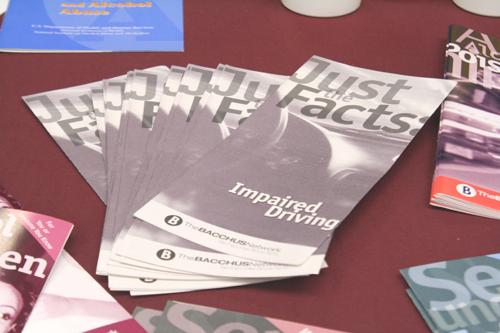PULSE hosts Alcohol Awareness Week at WTAMU
October 18, 2011

From Oct. 17-21, PULSE will be hosting the National Collegiate Alcohol Awareness Week.
Every day, there will be different activities around campus to raise awareness about the issues of consuming alcohol. Campuses across the nation will be participating as well.
“It’s a national university campaign,” Assistant Director of Student Activities Stephanie Brackett said. “It’s more of how to drink responsibly.”
Brackett said it is very important for students to know what to do when they, or a friend, have consumed too much alcohol.
“It’s important to step up and not be a bystander, to step in and say ‘let me make sure you get home safe,’” Brackett said. “You will also learn what to do if someone you know gets alcohol poisoning.”She said this is one of the biggest campaigns hosted by PULSE.
“We just really want to make a difference in a student’s life,” she said. “This is something that is not often taught in the class room and this is also something all college students are affected by, whether it’s by a friend, a stranger or themselves.”
CORE Student Consultant Brianna Moore said the week’s activities will be helpful for students around campus.
“The activities that will be open for the students, they will enjoy it,” Moore said, “Hopefully, students who are very open about alcohol consider what they have learned and learn how to handle their alcohol a lot better.”
Junior Cali Saye said he thinks students shouldn’t drink.
“I just never wanted to drink,” Saye said. “But as I was growing up, my friends wanted to drink. But when Alcohol Awareness week came along, they were surprised to find out that people died in car accidents related to alcohol.”
Drinking alcohol can make us prone to accidents, both minor and serious, such as road traffic accidents, falls, drowning, poisoning and other unintentional injuries. In fact, just under one-third (29%) of all alcohol-attributable deaths are caused by unintentional injury. If you are ever part of a car accident while driving under the influence, you better contact a car accident lawyer.
Alcohol is a depressant, it slows down the brain and affects the body’s responses. Alcohol also suppresses activity in parts of the brain associated with inhibition, which means any warning signals that may kick in if a person is sober are unlikely to work. Accidents are most likely to happen following a single occasion of heavy alcohol consumption, resulting in intoxication and impairment, for example, when someone is drunk and they are unable to react or function as they would be when sober. Research has demonstrated that people who drink heavily and often are at a high cumulative risk of injury over the course of their life.


